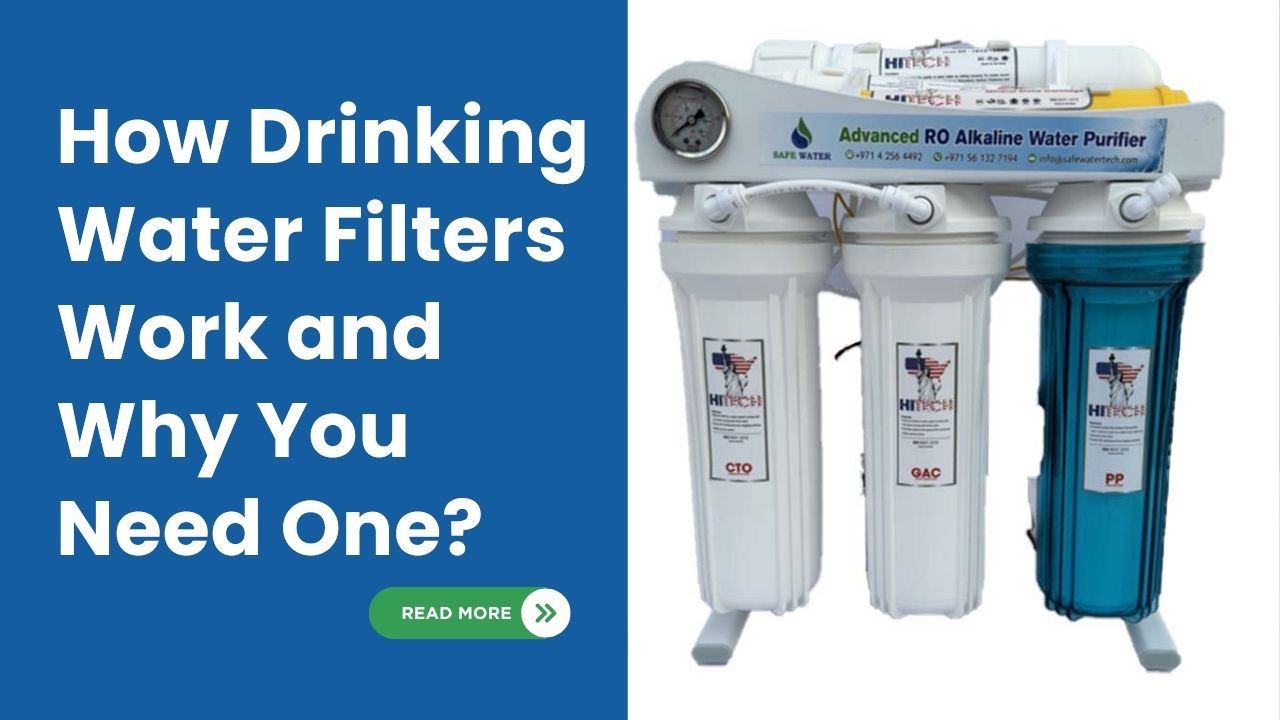Water is essential for life, yet not all water is safe to drink. Even though water supplied by municipalities undergoes treatment to remove contaminants, it can still harbor impurities like chlorine, heavy metals, bacteria, and harmful chemicals. Installing a drinking water filter is an effective way to ensure the water you consume is pure and safe. In this article, we will explore how drinking water filters work and why having one is crucial for your health and well-being.
How Drinking Water Filters Work
Water filters work by using various methods to remove or reduce contaminants from the water. These methods vary depending on the type of filter, but they all serve the purpose of making water safer and more pleasant to drink. Here’s an overview of some of the most common filtration technologies:
1. Activated Carbon Filters
Activated carbon filters are among the most commonly used filtration systems. These filters work by using a bed of activated carbon, which is highly porous. When water passes through the carbon, contaminants like chlorine, volatile organic compounds (VOCs), and bad odors are absorbed. The activated carbon attracts these impurities and traps them, allowing clean water to flow through. This process also improves the taste of water.
However, activated carbon filters are not effective at removing minerals, salts, and microorganisms. Therefore, they are often used in combination with other filtration technologies.
2. Reverse Osmosis (RO)
Reverse osmosis is one of the most thorough methods of filtration. It works by forcing water through a semipermeable membrane. This membrane has tiny pores that only allow water molecules to pass through, trapping contaminants such as heavy metals (lead, mercury), fluoride, arsenic, nitrates, and bacteria. RO filters are effective in removing up to 99% of contaminants, making them an ideal choice for households concerned with water quality.
However, reverse osmosis also removes beneficial minerals like calcium and magnesium, so many systems incorporate remineralization filters to add these minerals back into the water.
3. UV Filters
Ultraviolet (UV) water purification systems use ultraviolet light to destroy the DNA of harmful microorganisms such as bacteria, viruses, and protozoa. This method is highly effective at sterilizing water without adding any chemicals. UV filters are often used as a final step in a filtration system, ensuring that the water is microbiologically safe.
4. Ion Exchange Filters
Ion exchange filters work by replacing undesirable ions in the water, such as calcium and magnesium (which cause hardness), with more desirable ones, usually sodium or hydrogen ions. This method is primarily used in water softening systems but can also help remove heavy metals like lead.
Why You Need a Drinking Water Filter
While municipal water treatment plants do a decent job of providing drinkable water, they cannot remove all contaminants. Additionally, water can pick up impurities as it travels through pipes to your home. Here are key reasons why you should consider installing a drinking water filter:
1. Removes Harmful Contaminants
Even treated tap water can contain contaminants that pose health risks. Chlorine, often used to disinfect water, can form harmful byproducts like trihalomethanes (THMs), which have been linked to cancer. Lead, which can leach from old pipes, is another concern, especially in older homes. A water filter helps remove these harmful substances, protecting you and your family from potential health problems.
2. Improves Taste and Odor
Unfiltered tap water may have an unpleasant taste or smell due to chlorine, sulfur, or other chemicals. These impurities can make drinking water unpalatable. A good water filter will remove these contaminants, leaving your water tasting and smelling fresh. This can encourage you to drink more water, which is essential for staying hydrated and maintaining overall health.
3. Saves Money
Bottled water is a common alternative for those who are concerned about tap water quality, but it can be expensive and environmentally unfriendly. Using a water filter at home provides the same (if not better) quality water at a fraction of the cost. Over time, you’ll save money and reduce your reliance on single-use plastic bottles, contributing to environmental sustainability.
4. Convenience and Accessibility
With a water filter installed, you have easy access to clean, filtered water at any time. You won’t have to rely on purchasing bottled water or worry about running out. This convenience makes it easier to stay hydrated throughout the day.
5. Protects Against Emergencies
In cases of emergency, such as natural disasters or contamination of the water supply, having a water filtration system can be crucial. Filters can ensure that your water remains safe to drink, even when there is a temporary breakdown in municipal services or a boil-water advisory.
Conclusion
Investing in a drinking water filter is one of the best decisions you can make for your health and safety. These systems offer a range of filtration technologies, each designed to remove harmful contaminants, improve taste, and provide peace of mind. While tap water may be treated, it is often far from perfect. A good water filter ensures that you have access to clean, healthy drinking water at all times, saving you money and reducing your environmental impact. Whether you choose a simple activated carbon filter or a more advanced reverse osmosis system, the benefits of filtered water are undeniable.
Ready to enjoy cleaner, healthier water at home? Invest in a drinking water filter today and experience the benefits firsthand. Take the step towards better health and improved water quality—shop now or consult +971 4 256 4492 with an expert!
